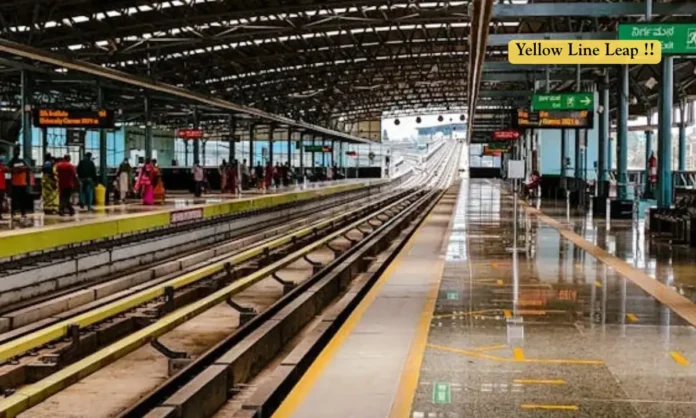Summary
- Infosys urges Bengaluru employees to use the newly launched Yellow Line of Namma Metro to bypass Electronics City’s severe traffic congestion.
- Dedicated skywalk, shuttle services, and fare options aim to make the Infosys Bengaluru Metro Yellow Line commute seamless.
- Limited train frequency is set to improve by 2026, potentially transforming corporate travel patterns in the city’s tech corridor.
City Commute Shift
Infosys Bengaluru Metro Yellow Line commute is emerging as a game-changing solution to Bengaluru’s notorious traffic congestion, especially for professionals traveling daily to Electronics City. With the recent launch of the Yellow Line of Namma Metro, Infosys has taken a proactive step to shift employee travel from congested roads to a more predictable, stress-free rail system. The initiative offers reduced commute times, better work-life balance, and measurable environmental benefits.
The new metro corridor connects RV Road in Jayanagar to Bommasandra, passing through Electronics City and directly linking with the Infosys Foundation Konappana Agrahara station via a purpose-built skywalk. By promoting this option, Infosys is not only improving daily commutes but also embedding sustainability into its corporate mobility strategy.
Beyond easing road congestion, the Infosys Bengaluru Metro Yellow Line commute could serve as a template for similar corporate-metro partnerships in other Indian cities. With the Yellow Line currently operating at limited frequency, early adoption from large employers may help accelerate service improvements and strengthen ridership.
Corporate-Led Travel Change
- Infosys has rolled out an internal communication campaign urging employees to use the Yellow Line for daily travel.
- The dedicated Konappana Agrahara station offers direct, secure access to Infosys premises.
The Yellow Line’s inauguration on 10 August 2025 and public opening on 11 August marked a milestone in Bengaluru’s urban transport network. Spanning 18.82 km with 16 elevated stations, it runs through one of the city’s most vital tech hubs. For years, Electronics City employees have faced unpredictable commutes ranging from 45 minutes to over two hours.
By actively promoting the Infosys Bengaluru Metro Yellow Line commute, the company is addressing these long-standing challenges. Feeder shuttle buses operated by the Electronics City Industrial Township Authority (ELCITA) are scheduled to match train arrivals, and a secure skywalk connects the metro station directly to Infosys Metro Plaza. This infrastructure ensures both convenience and safety for employees.
Travel fares remain affordable, with the National Common Mobility Card (NCMC), tokens, and QR tickets accepted, and a ₹60 fare cap for single journeys. Such initiatives are expected to boost daily metro usage among corporate commuters and further embed the Infosys Bengaluru Metro Yellow Line commute into everyday work culture.
Infrastructure and Early Response
- Commuters report less travel stress but note the need for shorter wait times between trains.
- Corporate involvement could stabilize ridership during the Yellow Line’s ramp-up phase.
While promising, the Infosys Bengaluru Metro Yellow Line commute faces operational hurdles. Official Bengaluru Metro Rail Corporation Limited (BMRCL) data confirms that only three trainsets currently operate, resulting in 25-minute headways. Full service with 15 trainsets is targeted for March 2026, which would significantly reduce waiting times.
The Konappana Agrahara station itself is a product of corporate collaboration. Funded by the Infosys Foundation, the station features half-height platform screen doors and carries naming rights for 30 years. These upgrades not only enhance safety but also set a standard for corporate-backed infrastructure in public transit.
BMRCL has observed steady growth in ridership during peak hours, particularly among corporate employees. Other large employers in Electronics City are exploring similar arrangements, potentially making the Infosys Bengaluru Metro Yellow Line commute a benchmark for sustainable workplace travel solutions.
Mobility Challenges and Opportunities
- Corporate partnerships can accelerate public transport adoption.
- Service limitations must be addressed to sustain commuter interest.
The Infosys Bengaluru Metro Yellow Line commute illustrates how the private sector can actively shape urban mobility patterns. By addressing accessibility, safety, and cost concerns, Infosys is tackling three of the main barriers to metro usage.
However, the project’s success depends on operational reliability. Longer train intervals could discourage adoption, highlighting the need for clear and transparent improvement timelines from BMRCL.
From a sustainability standpoint, promoting metro travel aligns with Infosys’s environmental goals. According to the Central Pollution Control Board (CPCB), vehicle emissions account for about 40% of Bengaluru’s PM2.5 air pollution during rush hours. A robust shift to the Infosys Bengaluru Metro Yellow Line commute could substantially reduce this share, improving air quality for the wider city.
Path Forward for Urban Transit
- Service expansions and multi-company adoption could transform Electronics City commuting.
- Policy incentives could encourage further corporate involvement.
The future of the Infosys Bengaluru Metro Yellow Line commute hinges on synchronized efforts between metro authorities and corporate stakeholders. Reducing headways to under 10 minutes could make the Yellow Line the default choice for thousands of tech professionals.
Bengaluru’s transport planners may also consider offering tax incentives for corporates that finance metro infrastructure or operate feeder services. Similar corporate-backed initiatives in other tech hubs like Whitefield could lead to a citywide reduction in private vehicle use.
As congestion continues to strain Bengaluru’s road network, the Infosys Bengaluru Metro Yellow Line commute could become a cornerstone of the city’s sustainable mobility strategy, an example of corporate action aligning with public interest.
Closing Note
The launch of the Yellow Line and the deliberate promotion of the Infosys Bengaluru Metro Yellow Line commute mark a significant convergence of corporate initiative, public infrastructure, and commuter needs. While operational limitations persist, the groundwork established by Infosys, through strategic infrastructure investment, last-mile connectivity, and employee engagement, sets a precedent for others to follow.
If BMRCL delivers on its service upgrade plans and more corporates adopt similar models, Electronics City could see a dramatic reduction in road congestion and improved air quality. The Infosys Bengaluru Metro Yellow Line commute might then be remembered as a turning point in Bengaluru’s journey toward a cleaner, faster, and more reliable urban transit system.


